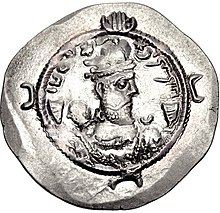| Bahram Chobin 𐭥𐭫𐭧𐭫𐭠𐭭 | |||||
|---|---|---|---|---|---|
 | |||||
| King of Kings of Iran and non-Iran | |||||
| Reign | 590–591 | ||||
| Predecessor | Khosrow II | ||||
| Successor | Khosrow II (restored) | ||||
| Died | 591 Fergana, Western Turkic Khaganate | ||||
| Issue |
| ||||
| |||||
| House | House of Mihran | ||||
| Father | Bahram Gushnasp | ||||
| Religion | Zoroastrianism | ||||
Bahrām Chōbīn (Persian: بهرام چوبین) or Wahrām Chōbēn (Middle Persian: 𐭥𐭫𐭧𐭫𐭠𐭭; died 591), also known by his epithet Mehrbandak ("servant of Mithra"),[1] was a nobleman, general, and political leader of the late Sasanian Empire and briefly its ruler as Bahram VI (r. 590–591).
Son of general Bahram Gushnasp and hailing from the noble House of Mihran, Bahram began his career as the governor of Ray, and was promoted to the army chief (spahbed) of the northwestern portions of the empire after capturing the Byzantine stronghold of Dara, fighting in the war of 572–591. After a massive Hephthalite-Turkic invasion of the eastern Sasanian domains in 588, he was appointed as the spahbed in Khorasan, beginning a campaign that ended in a decisive Iranian victory.
Bahram earned an elevated position in Iran due to his noble descent, character, skills, and accomplishments. The Sasanian king (shah) Hormizd IV (r. 579–590) was already distrustful of Bahram and stripped the increasingly popular general of his commands. Bahram began a rebellion aiming to reestablish the "more rightful" Arsacid Empire, identifying himself with the promised savior of the Zoroastrian faith. Before he had reached the Sasanian capital of Ctesiphon, Hormizd was assassinated in support of his son, Khosrow II, by another anti-Hormizd faction led by the two Ispahbudhan brothers, Vistahm and Vinduyih. As Bahram captured Ctesiphon, Khosrow II fled to the Byzantine Empire, with the assistance of which he launched a campaign against Bahram, who was defeated with his outnumbered forces, but managed to flee to the Western Turkic Khaganate where he was well received. He was assassinated shortly thereafter at the instigation of Khosrow II, who was then the shah.
Bahram Chobin's legacy survived even after the Arab conquest of Iran among Iranian nationalists, as well as in Persian literature.
- ^ Shahbazi 1988, pp. 514–522.